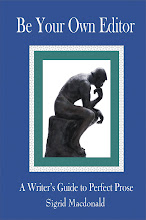Lately, I've been listening to a CD called "Warning" by Green Day. In fact, it's been on instant replay in my car. I often sing along -- only in private, mind you -- and I always sing the wrong word on a certain line. I finally figured out why that is. It's because the boys are mixing past and present tense, and I'm automatically filling in the correct grammatical version.
Here's the line from "Macy's Day Parade": "When I was a kid, I thought I wanted all the things that I haven't got." Okay. What's wrong with that sentence? The words "thought" and "wanted" are both in past tense, but the word "haven't," a contraction for "have not," is in present tense. There are a couple of ways to fix this. First, we could say, "When I was a kid I thought, I wanted all the things that I had not (or hadn't) got." That keeps everything in past tense. Second, we could have someone from the present reflect back on the past and rephrase the sentence like this: "When I was a kid, I thought, I want all the things that I haven't got." (Many people use italics for thoughts, instead of quotation marks.)
Who knew how educational Green Day could be?
Sigrid Macdonald, Author of Be Your Own Editor, now available on Amazon.com.
*This article was reprinted from www.editorwriter.org.
Monday, May 24, 2010
Tips for Writing a Smashing E-Mail: Part Two
Two weeks ago, I talked about why we should go out of our way to protect people's identities and privacy in e-mail. Today I'm going to focus on the importance of the subject line.
How many times do you receive an e-mail without a subject line? I get them constantly. How difficult is it to write two or three words, to let the person you're writing to know what your note is about? It will help him or her to prioritize the reading and response time for your message, and will add clarity to what you're trying to say.
For example, if you've been writing back and forth with a topic that started out discussing Charlotte Bronte and your monthly book discussion group, but by the fifth response, you've moved on to talking about your upcoming vacation to the Bahamas, change the subject line to reflect that. It’s confusing to receive a note that says, "hairdresser" when the message inside is all about the BP oil spill. Be clear and pay attention to the way that your e-mail can change topics from the original one.
Unless the material below in ongoing conversations is critical, and someone may want to reference it, it's thoughtful to delete the text. There's nothing like clogging up the bandwidth with clutter. It just takes a few extra seconds to be the one who clears the previous and now irrelevant messages. But don't do this if someone will need the info at the bottom of the page. Maybe it has a phone number, a meeting date or an important address. Check before you remove material.
And tune in on June 7th for tip number three on how to write a terrific e-mail.
Sigrid Macdonald is the author of three books, including Be Your Own Editor, now available on Amazon.com.
*This article has been reprinted from freelancezone.com.
How many times do you receive an e-mail without a subject line? I get them constantly. How difficult is it to write two or three words, to let the person you're writing to know what your note is about? It will help him or her to prioritize the reading and response time for your message, and will add clarity to what you're trying to say.
For example, if you've been writing back and forth with a topic that started out discussing Charlotte Bronte and your monthly book discussion group, but by the fifth response, you've moved on to talking about your upcoming vacation to the Bahamas, change the subject line to reflect that. It’s confusing to receive a note that says, "hairdresser" when the message inside is all about the BP oil spill. Be clear and pay attention to the way that your e-mail can change topics from the original one.
Unless the material below in ongoing conversations is critical, and someone may want to reference it, it's thoughtful to delete the text. There's nothing like clogging up the bandwidth with clutter. It just takes a few extra seconds to be the one who clears the previous and now irrelevant messages. But don't do this if someone will need the info at the bottom of the page. Maybe it has a phone number, a meeting date or an important address. Check before you remove material.
And tune in on June 7th for tip number three on how to write a terrific e-mail.
Sigrid Macdonald is the author of three books, including Be Your Own Editor, now available on Amazon.com.
*This article has been reprinted from freelancezone.com.
Monday, May 10, 2010
Part I: How to Write a Smashing E-mail
I'm writing a series for Freelance-Zone.com on how to write a smashing e-mail. Check out part one:
http://freelance-zone.com/blog/advice/uncategorized/tips-for-writing-a-smashing-e-mail-part-i/.
http://freelance-zone.com/blog/advice/uncategorized/tips-for-writing-a-smashing-e-mail-part-i/.
Subscribe to:
Posts (Atom)


